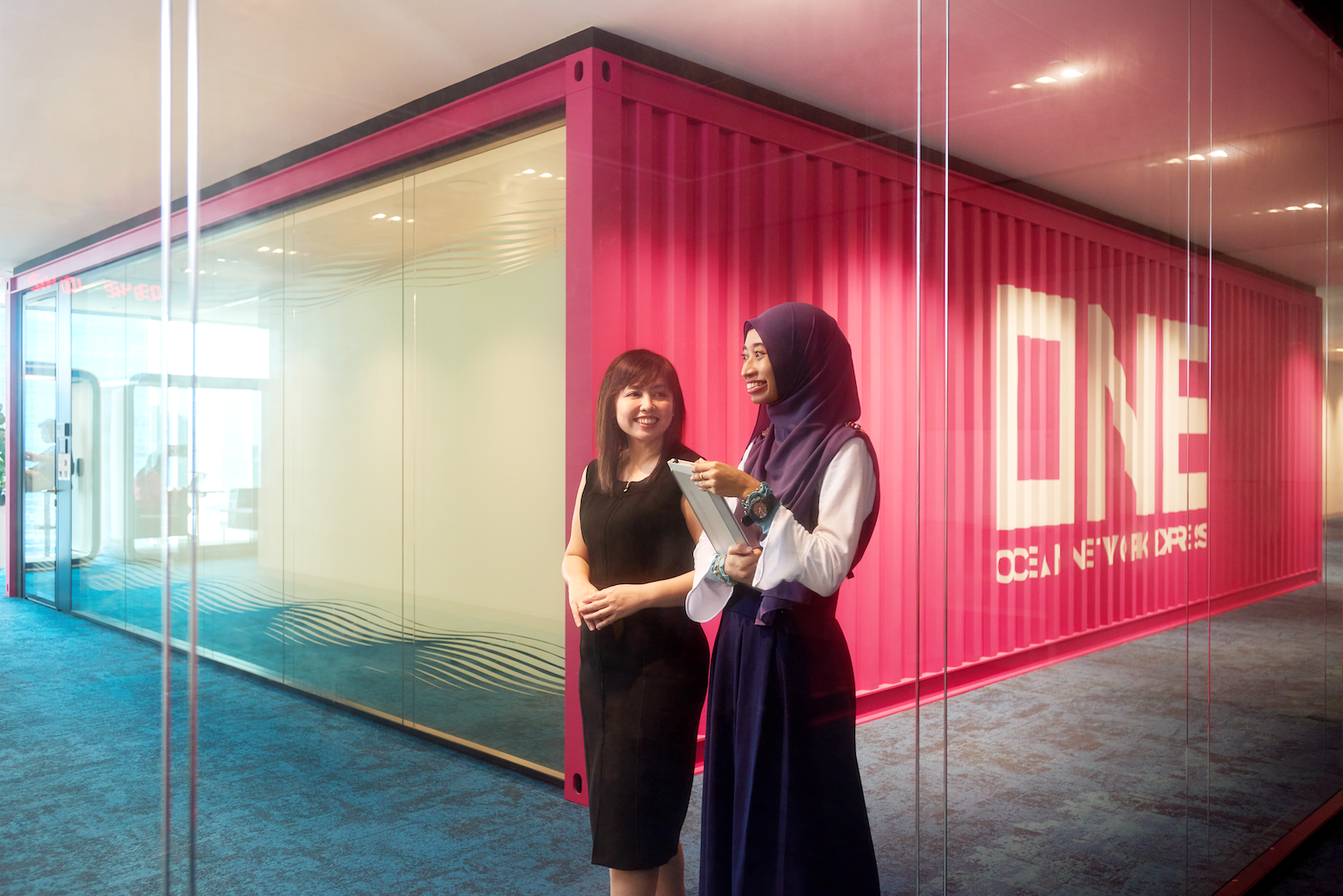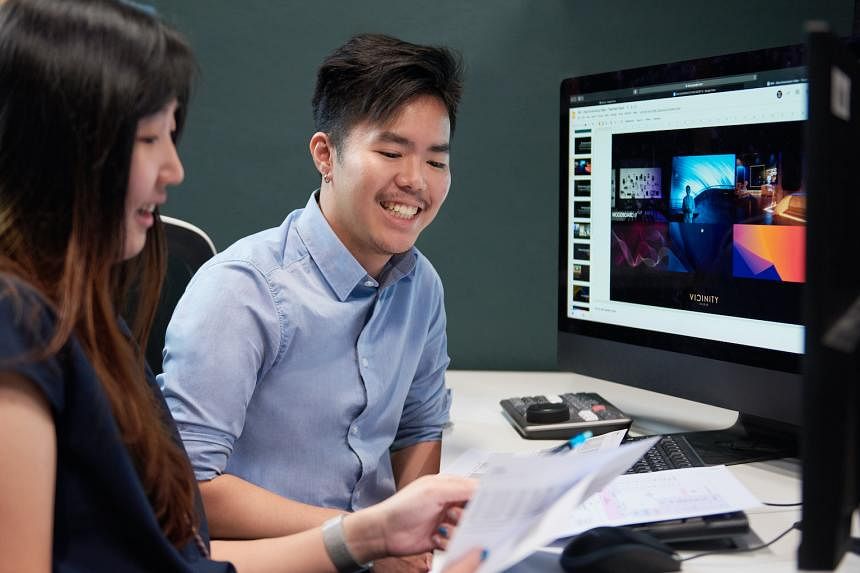As technology, sustainability and other major global shifts fundamentally reshape the way we operate, how can businesses enthuse and empower their workers with the skills to stay relevant and competitive?
Staff retraining is the modern mantra – and enterprises can seek guidance from refreshed Industry Transformation Maps rolled out by Singapore's Future Economy Council. The maps help firms across 23 sectors to equip employees with skills for greater value creation.
Two companies that have invested time and resources into cultivating their staff are now reaping outsized rewards. Their key message: To plug the labour drain, retain & retrain.
ONE for all its workers
As digitalisation sweeps the world of work, most companies find it fashionable to claim that staff upskilling is a priority. But rare is the corporation that actually matches such a mantra with money.
Global container shipping company Ocean Network Express (ONE) is one such company. Over the last two years, despite the pandemic, ONE has invested in staff training and development. This year, it has budgeted $1.6 million for these activities for its 500 workers based in Singapore.

That comes to an average of $3,000 per staff member. It's an investment that has helped the Singapore-headquartered company keep its staff when most companies are struggling with shrinking manpower.
“ONE’s annual staff turnover is less than 8 per cent – significantly lower than the industry average,” says Ms Tay Ai Lin, senior vice-president of global human resources.
Its global employee engagement score – a measure of commitment to work – was 83 per cent last year, higher than the national average of 60 per cent based on a 2021 study conducted by research firm Qualtrics.
“We must have done something right in the last two years, especially during the pandemic,” says Ms Tay, 53. “We were able to attract, develop and retain our people.”
Growing as one
To retain staff, ONE – the world’s seventh-largest container line – is actively making jobs more engaging, says Ms Tay.
Its solution? ONE Academy: Launched in August, it aims to strengthen connections and cultivate a sense of belonging through a series of engagement activities, and enhance the training framework for leadership, soft skills, functional competencies and talent development.
The company also has an online learning platform where employees can access bite-sized modules designed to advance their career.
With competencies outlined for staff across levels and functions, talented employees can develop the skills needed to excel in their roles and equip themselves with knowledge in emerging areas, such as technology and sustainability.
For example, staff can pick up data skills that dovetail with ONE’s digitalisation plans – like building an e-commerce platform – or take on green strategy projects to realise its goal of net-zero emissions by 2050.
ONE also has an internal transfer policy to provide employees with career advancement opportunities. Since last April, about 50 employees based in Singapore have been rotated into new departments to support their growth.
The company, which started operations in 2018, also wants to attract talent. It has created over 100 new roles in Singapore over the last two years as a result of its rapid growth. To groom future talents in the shipping industry, ONE also works with the Singapore Maritime Foundation and Maritime Port Authority to provide scholarships and internship programmes.
Beyond hard skills, ONE’s platform also offers staff the chance to pick up soft skills critical to workplace success.
Under the firm’s roadmap to develop a pipeline of future leaders, a senior executive, for example, can develop project management and presentation skills with the goal of becoming a manager.

At its Singapore headquarters, locals comprise about 70 per cent of the company’s workforce, with 25 per cent of them in managerial roles.
Managers themselves cultivate skills through courses, including leadership, communication, global mindset and how to lead teams virtually in a hybrid work environment.
“Based on feedback from engagement surveys, inspiration is important,” explains global human resources manager Belinda Wong, 43. “So managers will be trained on how to build trust, and how to be more inspirational to employees.”
Adds Ms Tay: “If our employees feel that we are willing to develop them and prioritise their well-being, they will be happy. Happy employees will go the extra mile. All this translates into better engagement, better productivity, and better outcomes for the business.”
From scrappy to happy
In its first two years, Vicinity Studio had all the trappings of a scrappy start-up: All five employees of the video production agency, which started in 2017, would report directly to its founder, Mr Kevin Ng, 28.
There were no defined teams, no human resources and sales divisions, recalls post-production supervisor Jason Mok, 29.

Today, the agency has scaled exponentially in size to 45 staff, with about half recruited as interns under the SGUnited Traineeships Programme.
It evolved over the years from offering straightforward corporate videos to commercial storytelling projects for big brands like Changi Airport Group, US toymaker Hasbro and Japanese food company Meiji.
What was behind this transformation? Not funding rounds, acquisitions or management consultants, but a simple roadmap created last June by Mr Ng, Mr Mok, and production head Cherlyn Ng, 33.
Under the Company Training Committee (CTC) – an NTUC initiative to upgrade Singapore’s workforce for the evolution of jobs – the three leaders spent five one-hour sessions with NTUC’s Creative Media and Publishing Union (CMPU) to craft a plan to revamp business capabilities. Vicinity is a unionised company under CMPU.
“Previously, there were goals Kevin set, but there weren’t well-defined steps we could take for each department,” says Mr Mok. “What CTC did was give us guidelines and structure.”
CMPU president David Teo shares that working with Vicinity through the CTC also helped the union identify skills needed for its members in the video production sector to stay relevant.
Mr Teo adds: “This was supported through training funds from NTUC's Employment and Employability Institute, as well as resources within the NTUC Training and Placement Ecosystem, such as leveraging the Operations and Technology Roadmap (OTR) to develop a structured plan for the company.”
This year, Vicinity was awarded the Plaque of Commendation at the NTUC May Day Awards in recognition of their efforts to grow the company through the OTR and assistance from the union.
Portfolio-booster
With the support, Vicinity matured inside-out. Among the key changes: The creation of a chain of command, the set-up of a human resource division, and the launch of quarterly check-ins with employees on professional growth goals.
“We did a lot of career progression planning to map out what each rank would require in terms of skills,” says Mr Mok. The agency has since outlined employee development pathways in the creative, marketing and customer management spheres, and encourages its people to attend sponsored courses every few months.

The variety of skills video makers must develop is vast, ranging from client management to technical competencies such as visual storytelling, lighting, equipment and editing software mastery.
“We have to keep an eye on the latest technology and stay on top of trends,” says Mr Mok, citing the rise of livestreaming, social media platform TikTok, and virtual reality.
As competitors are creating similar types of videos, he identifies upskilling as the key to standing out: “Being the expert in the next big thing is very important, because whoever's first gets the biggest portion of the cake.”
But perhaps the best outcome of better-skilled employees is the impact on the bottom line. Sales are up by nearly 70 per cent from the previous year, spurred by a surge in large, narrative-type projects, says Mr Mok.
The firm’s millennial and Gen Z workforce – aged between 21 and 34 – are delighted to work on such portfolio-boosting projects.
Ms Ng, the production head, shares that she does not feel stagnant at Vicinity, and is fond of the team spirit and camaraderie among the staff.
“The company is a good place for personal growth and career development. They constantly encourage us to learn. Both the business, and the employees, can feel the love.”
This is the fourth of a six-part series titled "Transforming today for tomorrow’s challenges" in partnership with the Ministry of Trade and Industry


